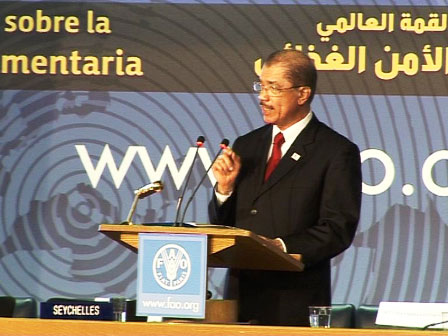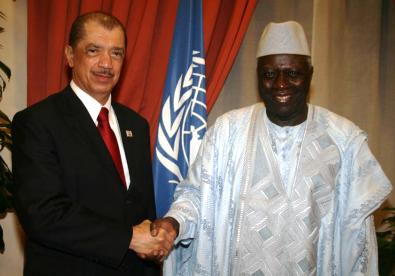President calls for courageous action to feed world’s hungry
Seychelles’ President James Michel has made a strong appeal to world leaders to fulfill their promises of feeding the more than 1 billion of the world’s hungry, while at the same time addressing the most pertinent looming crisis affecting world food security: climate change.

“Words and declarations, however well-intentioned they be, will not suffice to tackle the root causes of hunger. They will not wipe the tears off the face of a hungry, bloated child somewhere in the underdeveloped world. We need collective action to find lasting solutions for world food security. We need decisive action to free mankind from poverty and hunger. And we need it now!” said President James Michel.
The President was addressing heads of state attending the World Food Security Summit which opened yesterday at the UN Food and Agricultural Organisation headquarters in Rome, Italy.
President Michel called for more investment in agriculture to avert climate change as well as infrastructure, technology and environmental protection. He also stressed that developed countries needed equitable access to world markets as many subsidies practiced in the developed world are currently distorting trade to the detriment of developing countries.
President Michel also spoke of the new threat to food security in the Indian Ocean: piracy.
“Somali pirates are venturing deeper and deeper into our waters, taking hostages, menacing shipping lanes, pouncing on industrial fishing vessels and threatening our artisanal fishing and tourism related activities. My government moved quickly to gather regional but more importantly global support particularly with countries having interest in the region. I express my gratitude to them for their cooperation in eradicating the scourge of piracy which threatens our livelihood and food security.”
President Michel highlighted the plight of small island states in the imminent climate change crisis by pointing out that some small low-lying islands are already facing the forced displacement of their inhabitants. He pointed out that the changing climate is negating the rights of islanders to live and work in the land of their birth; as a violation of dignity and a threat to the very existence of the people.
“When it comes to climate change, there will be no second chances. There can be no bailouts or deficit spending to save the earth from this impending disaster. We need to commit to a deal on emission cuts which is real and scientific. We must act today, to save our tomorrow,” said President Michel.
Commenting on the upcoming climate change summit in Copenhagen in December, the President noted the importance of keeping the political and action-led momentum of this forum.
“Copenhagen was a beacon of hope, but its brightness is fading. We cannot afford for Copenhagen to be just a talk shop on climate change. It must rather be a forum on action to avert disaster. The choice is up to us. The choice to save humanity. We cannot at this late hour accept that a few countries which are primarily responsible for polluting our atmosphere hold hostage the survival of our planet.”
-------------------------------------------------------------------------------------------------------------------
President in talks with FAO director general
Following his address to the United Nations World Food Summit in Rome, President James Michel met Jacques Diouf, director general of the Food and Agriculture Organisation (FAO), to discuss Seychelles’ past and present food security concerns.

Mr Michel thanked Mr Diouf for the strong support of the FAO in the last few years, particularly in providing a timely response to Seychelles during the food crisis.
“We are very grateful to the FAO for the speed at which they responded to our call for support at the height of the global food crisis,” he said.
Mr Michel spoke to Mr Diouf about the inextricable link between food security and climate change and asked him to continue helping Seychelles in capacity-building in agriculture, such as training farmers to adopt new farming techniques and technologies to improve productivity.
He also asked for FAO expertise in fisheries, as well as in other projects that will be submitted by Seychelles, including support to modernise farming.
“Seeds and fertilisers were delivered within a few months of our request, and an agricultural fund for farmers was set up. The FAO support for our farmers was invaluable to us,” said Mr Michel.
The FAO allocated some US $250,000 to buy 50 tonnes of Nitrophoska fertiliser (NPK) and 25 tonnes of hydroponic-grade fertilizers, along with some 450kg of assorted hybrid vegetable seeds.
The balance of US $37,000 have been used to source about 100 small electric water pumps. All the items are being sold to the farming community on a cost-recovery basis with a view to build funds into an existing agricultural fund.
Mr Michel noted that the FAO was instrumental in mobilising resources for Seychelles after the 2004 tsunami.
Source: NATION 11-17-09

